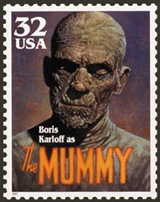
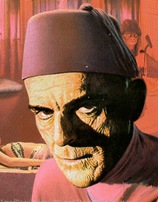
5/9/99
A few years ago when Interview with a Vampire was released, I thought, wouldn't it be nifty if someone made an equally classy and eerie mummy movie? We hadn't had a decent one since time out of mind.
Recently, there's been boo-loads of vampire (John Carpenter's Vampires, Bram Stoker's Dracula) and Frankenstein (Frankenstein (1993), Mary Shelley's Frankenstein) flicks. There was even a werewolf movie (though I hear American Werewolf in Paris wasn't very good). I know that of all the Universal Studios monsters, The Mummy was considered the least of many evils, but still, it seemed ripe for a high quality remake.
The possibilities are great - digital special effects, exotic scenery of ancient ruins and hidden temples, scrolls and amulets, spells, curses, books filled with forbidden texts - what more could one ask for?
To get some historical perspective, over the last couple weeks, I rented some mummy movies, particularly the "classic" 1932 version with Boris Karloff in the title role, and the 1959 with Christopher Lee.


Boris Karloff as The Mummy and Ardath Bay.
Don't get me wrong - I love old movies. Metropolis (1925) remains an all-time favorite, and that doesn't even have sound. Things to Come (1936) was the first movie I ever bought on videotape. I still considerThe Bride of Frankenstein (1935)the best horror movie ever made.
But I must admit that the old mummy movies seemed more creaky than creepy. Boris Karloff is indeed excellent as the Mummy, and his human alter ego, Ardath Bay. The best thing about his character was that he was motivated by love. All the great Universal monster movies are really love stories - Frankenstein's monster only wants a friend, a lover; Dracula is seeking someone willing to overlook his eccentricities and spend all eternity with him - aren't we all?
The Mummy has been cursed because, back when he was alive 3,000 years before, he fell in love with the wrong woman. Worse than that, he compounded his indiscretion by trying to bring her back to life after she died. For punishment, he was wrapped up as a mummy while still alive and sealed in a sarcophagus, the dead body of his love in an inaccessible chamber next door. So close, and yet so far. Thousands of years to ponder lost love. Oh the agony!
No wonder he was in such a grouchy mood when he was revived.
That's all fine and good, but the problem is that a mummy movie is still a horror movie. In the 1959 version, the mummy stumbles around, dragging one foot, covered head to toe in toilet paper, limping up to hapless fools who try to shoot him (Bullets? Useless!) and strangling them. Is this horrifying? No. Why? The viewer keeps thinking: The mummy is limping - why don't its victim simply RUN AWAY? (I think it is the Mummy's low fright quotient that led Hollywood to make more spoofs of the mummy than any other monster - that and the infinite pun possibilities like I Want My Mummy Back).
The 1932 version got around this problem because Karloff killed his victims by remote control. He watched them from afar and cursed them until they died of heart attacks. All his victims were ostensibly natural deaths. Clever.
Another bad thing about the 1959 version was that the Mummy was essentially a robotic golem, controlled by an evil Egyptian who wanted to get even with the archaeologists who had desecrated the tomb. He was only following orders when he killed. Karloff was his own man.
I was extremely curious which way this new version would go. Perhaps the mummy would become quick and agile, the ways dinosaurs underwent an accelerating transformation in Jurassic Park.
So, that was my mindset when I saw the new version of The Mummy.
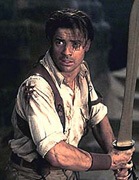
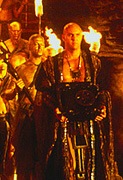
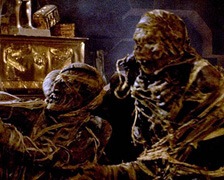
Hero, villian, mummy-raptors.
Now that I've seen the new The Mummy, I can report that it's a major re-tooling of the nature of the Mummy's villainy - and the weapons at his command. Not only is the Mummy after resurrecting his lost love, but he now threatens to take over the entire world. Gone is the motif of the Mummy doling out heart attacks from afar. Instead, the Mummy now controls hordes of computer-generated flesh-eating scarabs, computer-generated dust storms billowing in shapes like his lifeness, computer-generated mummies and mobs of boil-covered human slaves who chant "Im-ho-tep Im-ho-tep." Did I also mention that the Mummy can now quickly come and go in a pirouette of dust?
But... sometimes more is more. Sometimes less is more. In this case, more is less.
As I've discussed in length before, a major problem with many Hollywood movies isn't the look, but the listen. The Mummy is beautiful to behold: the ruins are spectacular, the gold is shiny, the battle scenes are vigorous. The mummy ninjas have indeed undergone Jurassification and now jump and fight with more energy than Ray Harryhausen's fighting skeletons in Jason and the Argonauts. The problem is that the film is populated by characters without character, beings who talk without saying anything interesting.
Why does Imhotep love his girlfriend Anck-Su-Namun? Just because she only wears a fishnet? Why does she love him? As played by Arnold Vosloo, Imhotep is smug, beautiful, athletic and self-centered: a high school jock. Is this shallow love the kind that we believe can last through the ages?
And, while we're at it, in the film's OTHER romantic axis, why do hero Brendan Fraser and heroine Rachel Weisz fall in love? (Besides the fact that it's Hollywood and they have to.)
In high school English classes, we were taught what makes characters really alive. Living characters change. They often make important realizations about themselves, sometimes finding out - just moments too late - that they have been after the wrong thing, and have brought all their woes upon themselves. In The Bride of Frankenstein Karloff's monster realizes that his attempts to embrace life, love and friendship are ultimately futile and he really does belong dead. In The Candidate Robert Redford realizes he's spent the whole movie fighting for election - without a single thought as to what he'd do if he won. In the best movies, the character's realization coincides with that of the audience. In Gorgo, we learn that this huge monster destroying London isn't evil as we thought - it was just a very large (and dangerous) mother (monster) retrieving a lost infant (monster). In the animated Batman and Mr. Freeze: SubZero (which, interestingly, has some plot similarities to The Mummy), we learn that Mr. Freeze isn't evil - he's just trying to save his dying wife. His plight is so sympathetic that his would-be enemies, Batman and Robin, decide to help him.
Needless to say, none of the characters in the new The Mummy have such revelations. Before each character completes a single line of dialog, we know that person's inevitable fate. There is no surprise, no tangible peril, not tears, no vulnerability, no redemption - and isn't that what both love and horror are all about?
Scoring:
Style: 8/10
Substance: 2/10.
Overall coolness level: 6/10.
Sequel probability: I'm still waiting for a great mummy movie.
Agree or disagree? Let me know.
Comments from Xanthippe Yorick 5/12/99:
Hi Frank Wu,
I read your review of "The Mummy", at http://www.frankwu.com/mummy.html and I share your feelings of dissatisfaction with it, but for slightly different reasons than you gave.
I think that Hollywood gave us sex, obsession, and affection with "The Mummy", but didn't actually try to give us love in the story. Imhotep seemed to have a slavish devotion to his Anck-Su-Namun, but I don't think he truly loved her. He hung on her every word and scurried to do her bidding, while her motivations were made clear with a single line, "No longer is my body his [the pharo's] temple" (Something to that effect)
Because I see more strength in her character than I think you do, I think that her mesh outfit was important- it showed her physical domination of Imhotep, it was a clue to her sexual power over her lover. Her body, contained tightly (to the bursting point) within the netting, was proud and lithe, a feline form that wanted to be free, and had the power to achieve that within itself- so she thought, anyway. Her beauty was (presumably) the cause of her enslavement and she hoped it was the key to her freedom as well.
Because she yearned to be her own master, I Ank-Su-Namun as concerned with herself, not Imhotep, but I'm not so sure this is selfish of her. Ordinary selfishness never seems to require courage, does it? Moreover, who sets the ethical standards for a slave's psyche and motivations? For me, it was more of a theme of self-actualisation, where Ank-Su-Namun is concerned, but I can see how you might find her self-centered, and cold.
I noticed she had no real concern for Imhotep when she urged him out of the palace, not to seek safety, as a woman in love would probably want, but to continue taking risks for her sake. Instead of being devoted to her lover, she was a Mistress who ordered her lover/servant to carry out her will. I doubt that Anck-Su-Namun would have ever died for Imhoptep's sake, as it was made obvious that she clearly expected to be resurrected. So I don't see theirs as a love to stand the test of time, I see it as one man's slavish devotion to a very spirited and willful woman who had overpowered him with her sexual charisma. We see further instances of Imhotep's slavishness in the sand storm scene, where he is exercising phenomenal power, only to be completely distracted by a kiss from the plucky little librarian.
You compare Anck-Su-Namun to Mr Freeze's wife, but I see these two women as fundamentally different. The Egyptian Mistress is not the frozen, passive, blonde beauty, but a woman who is willing to do anything, even face death itself, and even to take the life of another, to gain mastery over her own person. (Alora merely thaws.) So, with the Egyptian couple, we are given sex and obsession, and I think it suits them.
Perhaps you see something between the col. and the librarian that I missed. I thought that they shared a bit of affection and attraction by the end of the movie, the type of infatuation two people experience when they are thrust together in a set of life-threatening adventures. Did they ever speak words of love to each other? I never heard any. Over and over, we are reminded that the col. is merely grateful to the librarian for saving his life,(and I notice that she bargained and strived to get a good price when she did it) and we see in the hotel where the limits of his affection for her lie. He goes on to save her, of course, because that's his nature. His character, not true love, becomes his motivation at that point. What's a stero-typical hero to do?
So I wasn't disappointed with the less than love stories in "The Mummy". I found them refreshing, really. I knew that I was seeing a kids-oriented adventure film and I thought that the love relationships (if you can call them that, lol.) were carried out fairly realistically within the scope of the plot, and was a superior treatment to what you see in "Indiana Jones" films, or the saccharine soap opera love that "Star Wars" movies have given us so far. A more interesting movie may have been made if they had taken the Egyptian story further, but the bad guys would have had to been successful for that to happen, and Hollywood can't go against conventional mores in a medium for children, can they?
Anne Rice would probably have to get involved at some point, anyway.
Yet,as low as my standards are, my biggest quibble with the film was that Fraser seemed too soft to fill the col.'s shoes. The crusty col. had several great lines that fell a bit flat with Fraser's delivery. "Do you swear?" the Librarian asks. "Every damn day" the Col. says, but he says it too mildly for my tastes. Mr. Hollywood needs a good dose of verve, or at least some edge and zest to pull off the role of the col. which really isn't that demanding, it seems to me.
Fraser's eyes are too blue, too round, and too kind for many of the col.'s expressions also. It was simply a bad fit for me, and I like Fraser. No one could have been a more convincing George of the Jungle, for instance. I think that Disney had the right idea with Fraser. Show the mommies his bare ass and they'll buy more tickets. I'd truly have been happier with the movie if the females in the audience had gotten some equal time in titillation. Someone needs to spell this out for Hollywood. Show us the men! How did we have children to bring to the film in the first place, if we are not sexual ourselves?
I thought about what you said about making the love that lovers share more real to the audience with characters who go through a psychological changes. Shakespeare's "Romeo and Juliet", possibly the world's best love story, and certainly one of the most beloved ones, doesn't do this, in my opinion. With "Romeo and Juliet", we get an "instant" love that draws upon certain Elizabethan psychological concepts that are in conflict with the modern psychological realism. Later, we see that love explored with beautiful flowery speeches that bore most movie goers who choose action films, don't you think? The lovers do go through some sort of transformation when they have sex, but I suspect that you'd find this change too easy and too much on the surface, especially if you found used it in an adventure film, more especialy if it were done the same way Shakespeare did it.
Action, adventure, and special effects aside, I think any film about lovers is going to tax our suspension of disbelief to some degree, though some films may be more successful in getting a loving *feeling* across than others. Flesh actress Julia Roberts seems to have a genius for making you feel a loving emotion with her expressive face and body language, for instance. The emotions I always feel strongest from her are losses of love, however. She is her most convicning when she watches her lovers die, for me. This would fit in with your concept that the character's turning point coincides with that of the audience. Yet, how much true love is there in the examples that you gave? (I am unfamiliar with "The Candidate", but I notice that love fails in the other examples you mentioned.) It seems to me that Hollywood is much more successful in portraying the loss of love than in dramatising its nature.
That doesn't mean that I am not trying, though. In my own science fiction, I try to bring sex and love back to the genre. It makes me sad to see the sterility we get with the new "Star Trek" writing, for example. The producers and writers seem to think Baby Boomers are afraid of their bodies, or of strong emotions, and where is the banter and conflict you used to see with Spock and McCoy? Everyone gets along now, and it's boring. After a few years of Kate Mulgrew's rasping voice and sexlessness, I even miss the bimbo alien babes that Roddenberry gave his audience. 7 of 9 may have fabulous upholstered breasts, but she never has sex willingly, does she? Stop the teasing: it's an over used TV trick and we all know it. At least we got a little passion back then with Kirk, however compressed and reduced.
In my limited experience, I have found it impossible to develop a love relationship within the scope of one slim novel, though. Even DH Lawrence wrote to such lengths that he is hard to compress into a film's space. Lacking his immense talent, it takes me a few books to dramatise the course of true love, and I have to take my characters through a lifetime too, giving them children, or certain losses and problems, a few trials and tribulations to make thier inner conflicts and changes make sense.
This is where science fiction works for me, though, with its neat dramatic time compressions and alternative histories. I often wonder why there isn't more love in the genre. You get the chance to really flesh out the whole of human existence and emotion in the course of an entire space opera, while keeping true to that pesky psychological realism that today's sciences of the mind saddle modern writers with. However, unless you deal with love on some symbolic level, I'm not so sure you can dramatise it with less space.
What do you think?
Thanks for being such a clever writer; I enjoy your site and your work immensely,
Xanthippe Yorick [for whose writings click here and here]
My response to Xanthippe's comments 5/13/99:
Thanks for your comments about The Mummy! Your comments about Anck-Su-Namun are very insightful - and I do have to sheepishly admit that I was focusing my mental capacities on the mummy character and not on her. You have an interesting interpretation of her as the prime mover in their relationship - and in many ways he is HER slave. Interesting. Never saw it like that before.
I also agree that Anck-Su-Namun's character is different from that of Mrs. Freeze, but I was drawing a comparison between the Batman movie and Mr. Freeze's character and what the Mummy could have been, and I hadn't really thought much about the Mrs. Freeze/Anck difference - but you are right there.
I agree with you that Brendan Fraser did seem a bit out of place in this movie. I also heard that it cost them 80 million to make it and the only reason the execs ok'd that budget was that the filmmakers told them they were making a COMEDY not a HORROR movie. Well, that explains many things.
Doesn't justify faults, but at least explains their existence.
More from Xanthippe Yorick 5/14/99:
I think it's great you see Ank-Su-Namun a little differently now, but I can see why you were focused on Imhotep- he's the guy in the title, lol. I really liked her, and I thought her character deserved more lines, if not her own movie. You mentioned Rice in the opening of your review, and I have to agree Interview is superior by far to the Mummy, but that may be what happens when the writer retains artistic control and has the clout of celebrity herself. She has written a really pulsing Mummy book,(to borrow a phrase from Dorothy Parker!) btw.
Comments from Kevin P. O'Connell 5/14/99:
Hey Frank!
Bev wrote:
"Do you swear?" the Librarian asks.
"Every damn day" the Col. says, but he says it too mildly for my tastes.
The lameness here is doubtless due to the fact that the writer has seen "Patton", in which a chaplain asks him "Do you pray?" He answers, "Every gaddamned day!", which clearly is more pointed and punchy. The ripoff dilutes the original. Ah well.
Kev
PS--I passed up The Mummy. I did see The Matrix, tho, and it rocked. Yes, it's laced thru with inconsistencies, but *boy* I loved those leather togs, and of course the fx and story were very nice. And (shocker) I even liked Keanu Reeves, who seemed just thin and geeky enuff.
THE FOLLOWING COMMENTS WERE POSTED AFTER THE DEBUT OF "THE MUMMY RETURNS"
5/5/01:
I saw "The Mummy Returns" this weekend and I have to say, I liked it a lot more than the first Mummy movie. And I liked it more, apparently, than most of the reviewers. Yes, it was light and breezy and insubstantial, chock full of some really amazing special effects, but, hell, it was a LOT of fun - and isn't that what we want in a summer movie? After walking out of a matinee, I thought, My gosh, summer really is here. The long hard winter is over, time to play, time to have fun, time to see fun but stupid movies, time to go play on the swings and barbecue. In a way, seeing this movie really changed my world view - and what could be better than that?
As for the movie itself, I liked it more than the first because it really described the emotional axes of the first movie: (1) Brendan Fraser and heroine Rachel Weisz contrasted with (2) Imhotep and Anck-Su-Namun. Without giving away too much of the plot, I can say that we really see the contrast between true love, and selfishness disguised as true love. I thought that was quite powerful.
5/19/01 From: Kel Webb Gotta Go-- Kellie Webb
From Honololo Go 8/21/01
Back to Science Fiction Art Back to Kitsch
Tour U.S.A. Back to Official Frank Wu Homepage
Hello, can’t help to voice my
opinion after reading your comments about Anck-Su-Namun. Firstly,
I must admit that Anck-Su-Namun is really sexy and beautiful. Lets
see why Anck-Su-Namun has turned to be self-centered person. In
Mummy Part 1, she was forced to kill herself. Imhotep’s efforts
of bringing her to live have failed terribly. Remember
Anck-Su-Namun was destroyed when she was almost completing reborn?
Anck-Su-Namun was a queen for god sake!
Now in Mummy Return, Anck-Su-Namun is determined to get back what she
has lost. Will Anck-Su-Namun die for Imhotep? No way!
It was Anck-Su-Namun who brought Imhotep back to life. Imhotep owe
Anck-Su-Namun a lot and nobody seems to notice that.
There were so many occasions that Imhotep protect Anck-Su-Namun and do
just about anything she demanded. Anck-Su-Namun on the other hand
in all instances demonstrated extreme self centered and complete
overpowering of Imhotep. The first scene where all her workers
were dying being killed by insects, and she only smile. In the
house, where she was nearly hurt by her own poison snake.
How she quickly run away during the dangerous machine gun fight.
She even tried to seduce the boy in the train!! How the bandits
threaten her in the train, and she carefully compromised to avoid death
threats and bring in Imhotep. Then in the jungle Imhotep’s
concern was only about Anck-Su-Namun’s safety nothing else. Even
when in the building, Anck-Su-Namun quickly run away when she sees
Imhotep was transforming to something else.
The rest of the movie is full of questions –
1. Anck-Su-Namun stab Evelyn to death. How can Evelyn be reborn?
2. Anck-Su-Namun was kicking this nerd guy’s butt. How could he
managed to fight back by throwing punches to Anck-Su-Namun’s face?
3. Anck-Su-Namun was then fighting with Evelyn, and again how can Evelyn
win the fight? Anck-Su-Namun used to fight much better during
“those days”. And where the hell is Imhotep who is supposed to be
protecting her?
4. When Anck-Su-Namun run away from the dying Imhotep, he told her to
avoid the dangerous route. Why she didn’t hear that? Or
was Imhotep trying to give her false direction as revenge?
5. When Anck-Su-Namun saw those insects, why can’t she just run away?
She’s much taller than those insects. Must the movie producer
make her die?
6. Why is Anck-Su-Namun afraid of insects? I though she was a
mummy. If she can handle Imhotep, she can handle those little
insects.
7. Assuming if Anck-Su-Namun did successfully ran away together with the
rest, what will happen at the end when Anck-Su-Namun was stucked with
people like Rick, Evelyn, etc?
OTHER MOVIE REVIEWS: Austin Powers (References), Being
John Malkovich, Blah Witch Project, Deep Blue
Sea, Dogma, Dune, eXistenZ, Iron
Giant, The Matrix, The
Mummy, Princess Mononoke, The Sixth Sense,
Sleepy Hollow,
Smallville,
Star
Trek IX: Indigestion, Star Wars: The Turgid Menace,
Thirteenth Floor, Toy Story 2,
Trekkies,
Vile Vile West, The World Is Not
Enough